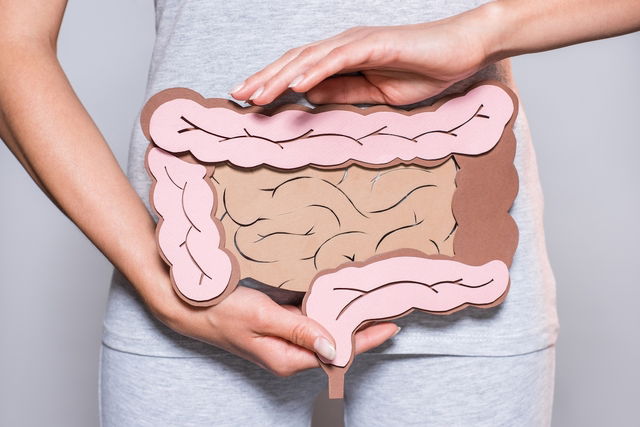White poop can occur with various digestive-related health conditions like gallbladder stones, hepatitis and biliary duct disease. It may also be a side effect of medication, and can occur with antibiotic use, dietary supplements and some analgesics.
White poop is not always a sign of illness however, especially if you don’t notice any other symptoms. Normally, stool is brown in color due to the combination of bile, intestinal substances and digestion by-products. Factors related to decreased or lack of bile in the intestines can cause lighter colored stools that may be white.
Pale or white stool, also referred to as "acholic stool," usually occurs with symptoms like abdominal pain, yellow skin or eyes (jaundice), or dark urine. If you notice these symptoms, you should be seen by a family doctor or gastroenterologist.

Why is my poop white?
White poop can occur for the following reasons:
1. Gallstones
Gallstones formed in the gallbladder or in biliary ducts can be large in size and cause an obstruction. This block the flow of bile to the intestines, leading to light-colored stools and other symptoms like yellow skin or eyes (jaundice), generalized itching, abdominal pain, nausea, vomiting and dark colored urine. Read more about what causes gallstones and other associated symptoms.
What to do: You should consult your family doctor or gastroenterologist for testing to confirm the presence of gallstones. Treatment usually involves a surgical procedure to remove any obstructing stones and preventing further complications. There are also some natural remedies for gallstones that you can use as a complement to your prescribed treatment.
2. Medication use
Medication-induced hepatitis caused by medication that overwork the liver can impact its functioning, leading to an abnormality in bile production. This can alter the color of your stools. The most common medications that cause lighter-colored stools are antibiotics, although this side effect is not experienced by all. Other medications that can cause white poop include diet supplements, homeopathic medications, anticonvulsants, antihypertensives, and analgesics.
This type of hepatitis is not always easy to identify based on symptoms, but some people may additionally notice dark urine, nausea, vomiting, abdominal pain, and jaundice, which can occur 5 days to 3 months after starting the medication.
What to do: You should notify your prescriber that you are having symptoms with your medication, so that the doctor can consider discontinuing it or swapping it for an alternative.
3. Viral hepatitis
Viral hepatitis, like hepatitis A, B, C, D or E, are relatively common infections that can cause white, stool, jaundice and dark urine.
Other common symptoms of viral hepatitis include fatigue, nausea, weight loss, fever, abdominal pain, diarrhea, joint pain and rashes. See the other common symptoms of hepatitis and learn more about what can cause it.
What to do: You should see your family doctor or a gastroenterologist to confirm diagnosis and start treatment as needed. Treatment varies depending on the type of hepatitis can can include simple interventions like ensuring hydration and using medications to treat fever or pain. Some people are also prescribed more specific medications, like antivirals, to treat the infection.
4. Post-op complications
Some surgeries involving the biliary ducts, like a gallbladder removal, can cause bile obstructions. These complications can lead to white poop, as well as other symptoms like jaundice and intense itching.
What to do: Ideally, you should see your surgeon to assess your symptoms and initiate prompt treatment. The treatment may involve another surgery to repair the biliary ducts.
5. Biliary duct tumors
Although it is more rare, tumors in the biliary ducts, gallbladder or surrounding areas can also cause changes to stool color.
Many times, tumors do not causes any symptoms at first, but overtime they can start to appear. Common symptoms, in addition to white poop, include abdominal pain, jaundice, itching, weight loss and general malaise.
What to do: If you suspect you may have a tumor, you should see your family doctor or gastroenterologist for a thorough assessment. The doctor will order testing to confirm or rule out a diagnosis. Treatment depends on the type of tumor identified, but it usually requires surgical removal.
6. Biliary atresia
Biliary atresia is a significant cause of white stools in babies, especially newborns. This condition is characterized by parts of the biliary duct that become obstructed due to swelling and fibrosis. Newborns who are affected will usually present with symptoms within 2 to 5 weeks of life, which include white stools and persistent jaundice.
What to do: The child should be seen by a pediatrician as soon as possible, as early diagnosis and intervention can help to restore normal bile flow much quicker with less complications than if left untreated.
7. Bile duct cyst
A cyst in the bile ducts is another significant cause of white stools in babies. It is characterized by a dilation in the biliary ducts that transport bile and can happen once the baby is born. Most affected children present with symptoms related to abnormal bile drainage like jaundice, white stools and abdominal distension.
What to do: The child should be assessed by a pediatrician or pediatric gastroenterologist so that testing required to confirm a diagnosis is ordered. Testing may include imaging, like an abdominal ultrasound. Treatment involves surgical removal of the cysts.
Diagnostic tests
Tests that can help to confirm or rule out the possible causes of white stools can vary depending on the underlying factors, however doctors will usually start off by ordering:
- Bloodwork to evaluate hepatic enzymes, alkaline phosphate, gamma-glutamyl transferase and bilirubin
- Bloodwork to detect the presence of hepatitis-related antigens or antibodies
- An abdominal ultrasound to visualize the liver, gallbladder and biliary ducts
In addition to these tests, the doctor more order more specific exams, like a CT scan, endoscopy or MRI. Some cases may require a liver biopsy to determine the severity of the diagnosis.
